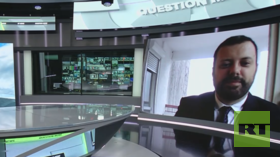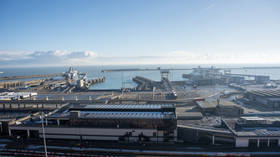Do Americans have a clear picture of what's happening in the world?
Katrina vanden Heuvel, editor and publisher of The Nation magazine, the oldest running magazine in the US has shared her views on the American mass media with RT.
RT: American newspapers are going bankrupt. The mainstream media seems to be losing the trust of the American people. What led to this and what should they do to keep afloat?Katrina vanden Heuvel: The crisis of the newspaper industry is a long story. But we’re seeing a tectonic shift as you’ve described, with the newspapers going under. It’s also the crisis of the journalism. I don't know about people losing trust, but the mainstream media has failed to do its news job in the last few years. If you think about how it covered the run-up to the war in Iraq, it failed to give people the news they needed. Or the banking scandals of these last couple of years. But we do need strong, vibrant news organizations. Because without them – who is going to be a watchdog for abuse and corruption and who will nurture democracy? So, there is ongoing vibrant debate in this country on how we can save good journalism. And the Internet is maybe the place where we could do it. I’m not opposed to the nation as a vibrant website to having real journalism on different platforms. But we must maintain strong independent vigorous news-gathering and journalism. And there must be new models for journalism, so that it becomes again a public interest and not simple profit gathering.RT: Do you think there's a battle going on between the mainstream and the alternative media? Who should the American people trust in this case?K.V.H.: The media landscape has many different patterns. You have the New York Times or the Wall Street Journal and Washington Post – established newspapers. But then you have all the Internet sites. How do you describe them? Some of them are becoming more mainstream and newspapers have their own Internet sites. So I think what you're seeing is people finding new ways of gathering and collecting the information they need.RT: Do you think the American people may not be getting enough information when it comes to issues of foreign policy or deeper analysis of the situation in the world?K.V.H.: Absolutely! But I think it has been a long-running problem. Let's be honest: there are two, three, four Americas. As there are two, three, four Russias. There are people who are reading the New York Times or the Wall Street Journal and getting some foreign reporting which you may disagree with, saying it is biased, but it is deep reporting. And then there are millions of people who are getting ten minutes of radio a day, or their local news station, where they don’t get a sense of the world.So that when 9/11, for example, hit this country, there was a hope that that tragedy would lead Americans to want more news from abroad, to understand the world in which they lived. But instead what happened, I fear, is that the economy led news organizations to continue making cuts in their foreign bureaus and so many Americans then saw the world through the prism of fear and terror, as opposed to trying to understand what was going on in the world around them.RT: Do you see a lot of bias in the American mainstream media right now?K.V.H.: I don't think that objectivity truly exists. So is there bias? Fox News, you can say it's biased, but they are pretty open about their principles and their values, if you want to call them that. I think we are moving to a more European and more Russian newsgathering organization system which in Russia. As you know, your newspapers have strong political views in their reporting as well. In Europe, in London and Paris – it is the same. Vibrant news organizations and newspapers are open about their political belief systems. That may be one root that will engage people more.RT: Let's talk about US bipartisanship. Some reports have lately been saying that more people are becoming independent and moving away from both the Republicans and the Democrats. What does this tell us? Do you think this could be a sign that Americans have basically gotten tired of the endless debates between them, or what is it?K.V.H.: Well, first of all, I think we're a poor country in the sense of that we should have 3-4-5 political parties. But we have two main political parties. When you see the polls about independents, over the years the independents have grown as a cohort. But for the most part what are you seeing is a growing shift toward the Democratic Party. And that has more to do with the belief that government has a role to play in the economy after this last year’s economic crisis. Nearly 47 million people don't have health insurance and people are seeking answers to that. Or that the country demographically is becoming younger and more tolerant, which means they are sick of some of the cultural issues like homosexuality as a hot button issue that the Republicans has played on.RT: Afghanistan. We are locating more US troops and efforts there. Good idea or bad?K.V.H.: I fear that military escalation in Afghanistan could endanger the promise of Barack Obama's presidency. I think it could bleed the resources needed for economic recovery. It could alienate our allies. It could alienate Russia. It could also alienate people in the Muslim world who are beginning to rethink America as we leave Iraq. So I think it's not a good idea, I think we need to seek effective, non-military alternative solutions: economic aid, reconstruction, targeted assistance, regional diplomacy. There is the beginning of the opposition, because for too long too many thought Afghanistan was a war we should have fought after the 9/11. It is no longer 2001, it is 2009. So we need different solutions than military ones.RT: The US military has been sort of reluctant to release information when it comes to Afghanistan or Guantanamo. Why do you think that is?K.V.H.: Whenever a country feels itself at war, and I think we need to end this War on Terror – Barack Obama has said we need to end the use of “War on Terror”, but we're still in that framework. But what happens is you lose transparency. You lose accountability. So, there is a movement in this country, and all real change comes about from movements from below, pushing those in power to rethink their stance. But I think we will be a more secure country if we stay true to the values which make us a great country and that has to do with freedom of speech, freedom of access to information, and transparency. And to understand that we can be secure and free and have civil liberties at the same time.RT: Shutting down Guantanamo. The US seems to be reluctant to relocate all of its detainees to its own territory. This is not really sending the best signal to other countries that were previously willing to help. How do you generally assess the way the US government is handling shutting down the prison camp?K.V.H.: Well, let me begin with the fact that the Republican Party, the legacy of the Bush administration, Vice President Dick Cheney, for example, has chosen to go from living in an undisclosed location for years to now being on every talk show he can find. And the Republicans are using the battle of national security to bring fear to people. The great American President Franklin D. Roosevelt had the expression that “There is nothing to fear but fear itself”. The Republicans, I like to think, have nothing to fear but the end of fear itself.So what has happened is that Republicans with some Democrats are running in retreat from Barack Obama's promise to close Guantanamo and relocate detainees. We can do it. We have supermax prisons. We have court systems which have handled terrorists before. If we don't take in some of the detainees, yes, of course, it's double standards, it's hypocritical. Others around the world will look at Americans and say “If you're not, why should we?” I think there needs to be some real hard-thinking and some negotiation and some political work done to find a way to close Guantanamo and do it effectively and bring some of the detainees here in a very secure way.RT: Barack Obama's first several months in office – what promises do you think he has kept and which ones is he failing to keep?K.V.H.: First of all, we do have a mantra of judging someone in their first 100 days. The battle is on to pass some of his signature economic reforms: to pass health care, to pass energy reform, to give workers more rights to organize and to reengage a world which is eager to engage after eight years of the Bush administration. I think what Barack Obama has done, though it was flawed in some ways, he has passed the stimulus bill to help with the economic recovery, to bring and create jobs. He has also pushed through a progressive budget. The bank bailouts are still problematic. I think, to the taxpayers, there should be a distinction between saving the banks and the bankers. But he has held firm on his promise to spend and use government support to help this country regain security. Because the biggest deficit we face is a public investment deficit. Barack Obama has broken with the decades-long, if I can use the word BS here, about keeping government out of the country's business.RT: Let's talk a little about Russia and the US. There's been a lot of reset of ties. What kind of steps do you think have really been taken in that direction and what needs to be done to actually become a reality?K.V.H.: Well, not enough. I have to tell you. I think there's been a lot of talk about reset. The meeting comes July 6 in Moscow. I think there's a new attitude, a new spirit. Of course there will be attempts to do some good arms control work, which is imperative. A real reset will require America to rethink its policies of these last 20 years. Its triumphalism. It needs to rethink NATO expansion. It needs to understand that Russia has rights in its own backyard. Political sovereignty for Georgia and Ukraine, sure – but no more NATO expansion. It also needs to think hard about engaging Russia on counter-terrorism, on Afghanistan and on Iran. There is a lot of work to be done but first and foremost, America needs a rethinking of some of the architecture of its US-Russia policies of these last 20 years post Clinton.I hope there will be a better reset because it would make the world safer and more secure place and much more could be done. Those who think we can move forward diplomatically or politically without Russia as part of the working group I think are fundamentally wrong.













